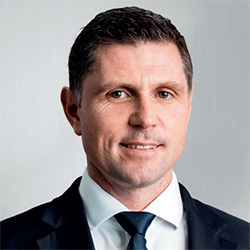 Marc Nightingale, Senior Client Advisor at UBS Wealth Management in Jersey, discusses how LGBTQ+ people can build investment strategies to help meet their financial goals
Marc Nightingale, Senior Client Advisor at UBS Wealth Management in Jersey, discusses how LGBTQ+ people can build investment strategies to help meet their financial goals
The obvious question when writing about LGBTQ+ investment is why the LGBTQ+ community – which includes lesbian, gay, bisexual and transgender people – would need to invest differently from the cis-gendered heterosexual community.
The answer is that full legal and social equality does not exist anywhere in the world.
Sexuality prejudice is still widespread, with more than a third of countries making it a crime to be LGBTQ+.
When different groups face different social or legal environments, they need to invest differently to deal with the challenges that they face.
While the main concerns of investors are the same, regardless of gender or sexual orientation, LGBTQ+ investors are likely to have different needs and challenges.
The prejudice that the LGBTQ+ community faces also means that investment decisions by the community and allies are potentially more powerful in their impact.
Investing with values in mind
Investors want to have investments that fit with the values they hold. The rise of sustainable and impact investing is a key part of this. The LGBTQ+ community may choose to align their financial decision-making with their values around equality for LGBTQ+ people.
Different investors may choose to reflect their values in different ways.
Some LGBTQ+ investors may decide to exclude investments in companies that have a poor track record on LGBTQ+ rights and equality.
Such a signalling effect, however, is unlikely to drive major corporate change as individual investors will not have the size (as a share of total share or bond capital) or influence needed.
Other sustainable and impact investment approaches might deliver both superior financial and social returns compared with an exclusion approach.
Aligning investments with values can also extend to building a financial legacy. LGBTQ+ investors may want financial resources surplus to their lifetime needs to be used in support of LGBTQ+ causes.
Some may choose philanthropic causes that support environmental and social causes, including LGBTQ+ rights. Others may elect to build a financial portfolio that invests sustainably or impactfully to maximise financial and social returns.
Investing is about more than personal financial goals. LGBTQ+ individuals may invest their human capital and time into supporting LGBTQ+ causes – whether that might be through volunteering or mentoring, or bringing relevant skills to LGBTQ+ businesses.
Linking LGBTQ+ investors to businesses through networks can help connect people for a better world, in terms of greater equality of opportunity, potential access to pools of private capital and to learn best practices for starting and running a successful business.
 Wide range of approaches
Wide range of approaches
Some approaches signal an investor’s approval or disapproval of a particular way of doing business. Exclusion approaches could eschew the stocks and bonds of firms whose environmental and social policies do not match an investor’s affinities.
Inclusion strategies seek to invest in companies whose environmental, social and corporate governance (ESG) characteristics align with an investor’s values.
There is limited evidence that exclusion leads to higher financial returns, though such an approach may help investors with risk mitigation.
Inclusion strategies can help to increase financial performance. One such example is that businesses that have a superior track record around diversity, equality and inclusion may enjoy commercial benefits over their peers.
LGBTQ+ investors might consider longer-term thematic investments that align with their values. Themes may match with general affinities towards environmental factors – such as clean energy and greentech – or social factors such as education services.
Themes could be chosen because they match LGBTQ+ challenges, such as investing in retirement living that is inclusive for the LGBTQ+ community.
Other investment approaches that have the potential to deliver commercial and environmental or social returns include impact investing.
These kinds of investments seek to deliver demonstrable and material improvements in social or environmental outcomes in ways that also improve financial performance, such as higher revenues, reduced costs or increased efficiencies.
In a UBS Wealth Way approach, sustainable and impact investing may be particularly interesting for your legacy strategy*.
These funds are earmarked for use beyond your lifetime. The long investment time horizon and your potential desire to leave the world a better place may mean that this strategy can be filled with longer-term, less liquid, but potentially higher return potential investments, such as private markets.
The UBS Chief Investment Office has already concluded that excluding people based on their sexual or gender orientation is bad for economic prosperity.
Economics is not the main argument against prejudice, but it is one of many, and it is likely to become more powerful over the next 10 years.
* Strategies are subject to individual client goals, objectives and suitability.
Further information
To find out more about how we can support your investment strategies, please contact Marc Nightingale for more information:
Marc Nightingale, Senior Client Advisor, UBS AG, Jersey Branch, 1 IFC, St Helier, Jersey JE2 3BX
Tel: 01534 701173
Email: marc.nightingale@ubs.com
UBS AG, Jersey Branch is authorised and regulated by the Jersey Financial Services Commission for the conduct of banking, funds and investment business. © UBS 2021. All rights reserved.
• This advertising feature was first published in the 2021 Funds Edition of Businesslife magazine